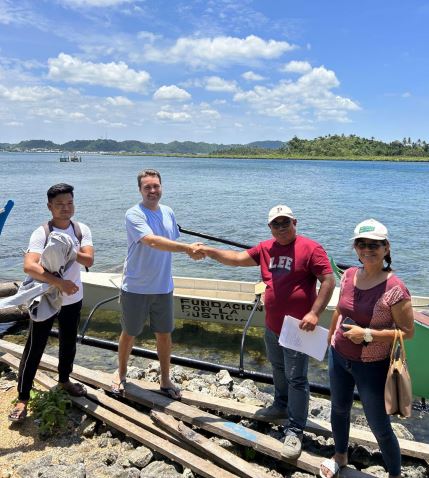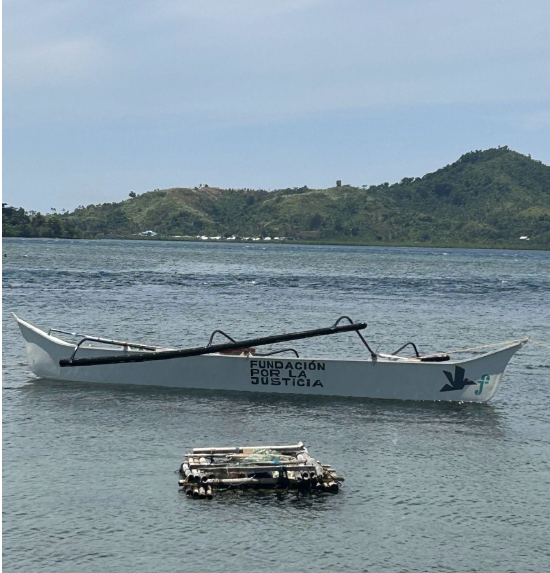There are events that, no matter how catastrophic and devastating, bring out the best in human beings.
What I said happened on the Philippine island of Siargao, following the devastation caused by “Odette”, internationally known as “Rai”, a category 5 super typhoon – the highest category recorded – with winds exceeding 300 km/h, which completely devastated the island of Siargao and a dozen others, on December 16, 2021, leaving a trail of deaths, injuries, homeless residents and leading to very harsh living conditions.
The island was declared in a “State of Calamity” by President R. Duterte on December 23, 2021, due to the lack of water and food, basic medication, electricity and communications of any kind; Homes and businesses were destroyed, as well as infrastructure, public buildings and fishing boats, and its nature was severely damaged.
Guillermo Latorre Miró, a 34-year-old Valencian businessman and resident on the island of Siargao since 2018, was one of the foreigners who, despite the difficulties, decided not to evacuate the island as the local government and the Consulate recommended. Thus, he decided to stay and try to help the recovery of the Island as much as possible.
Before the typhoon, he offered shelter in his establishment to his neighbors in case the situation became dangerous, as they refused to evacuate their homes until the last moment. Immediately after the typhoon, the structure of his business, which was badly damaged but standing, became a temporary shelter for his employees and neighbors, whose houses were semi-destroyed and flooded. There were a couple of days of shock after such an impact of nature and, upon seeing that no help of any kind was arriving on the island, Guillermo took action by starting a solidarity kitchen campaign for those who had lost everything.
With more improvisation than planning, Guillermo organized the first solidarity kitchen to feed his employees and neighbors with the leftover stocks of food he had in his business. His employees and immediate neighbors did not hesitate to pitch in, and began to cook daily for the neighborhood and boil water from the well to be able to offer something to drink to the neighbors, who did not even have water. Thanks to the multitude of people who collaborated with his campaign, including large and small NGOs, foundations, schools, universities, as well as businessmen and a multitude of friends from a distance, in the following weeks Guillermo managed to begin establishing a network of solidarity kitchens in different locations on the island, in order to cook for the neediest inhabitants of Siargao and in the most isolated areas, some with access only by boat, always prioritizing the feeding of children and the elderly.
After a great economic push by the World Central Kitchen of the renowned Chef José Andrés, in the month of February, the number of solidarity kitchens grew and reached five, increasing their productive capacity and exceeding the figure of 3,000 -3,500 meals served per day during the months of February, March and April 2022. After four months of campaign and together with a motivated team of more than 50 volunteers led by Guillermo, they had managed to exceed 239,000 meals served, an unimaginable number of reach in improvised stoves with wood and without refrigeration of any kind, except ice that could arrive from other islands by boat, from time to time and with luck. Simultaneously with the solidarity kitchens, Guillermo received international aid that was used to rebuild nearly 50 houses and roofs of the homes of all his employees and his closest neighbors in the neighborhoods of Purok 1, General Luna and in Purok 3, Unión.
During April 2022, despite the help received, the situation on the island was still certainly disastrous, especially for the local population, with many areas to be rebuilt and without electricity connection, with problems with the distribution of food and medication and, in turn, with the majority of the population without work and without a stable livelihood, since tourism had completely disappeared from the island.

Foundation for Justice in the Philippines
Unfortunately, the idea was beginning to take shape that solidarity kitchens were not going to solve the problem of food shortages in the long term. Thus, Guillermo motivated by the unconditional support received from family and friends, and acquaintances of these, decided to launch the third phase of his recovery aid campaign for the island of Siargao: Provide a means of subsistence to one of the sectors most disadvantaged on the island: the local fishermen. The idea was to attack the food shortage problem at its roots, by building bangkas, motorized fishing boats for fishing families who lost their livelihood during the typhoon. What began with the idea of building one or two boats ended, after months of long and laborious process, with a fleet of 9 fishing boats powered by 16 horsepower diesel engines.
Thanks to the generosity of the donors and volunteers of FUNDACIÓN POR LA JUSTICIA and, especially, thanks to the coordination of José Mª Tomás y Tío and Alejandro Mañes, the construction process of the Barca FxJ was completed at the end of June 2023 and, after several touch-ups and navigation tests, it has been donated to the Primary Public School of the small “Cambas-Ac” neighborhood, located in an area of the municipality of Dapa, with difficult access only by sea.
The construction process has been completely artisanal, hand-carving a large wooden trunk to obtain the main hull, and working with bamboo and other woods of different densities to achieve the buoyancy and balance necessary in the Bangka. Logistical and construction process setbacks were greater and more frequent than anticipated. First of all, since Siargao Island is an environmentally protected area, SIPLAS (Siargao Island Protected Landscape and Seascape), the logging and trade of certain types of wood and logs is not allowed on the island, so it had to be look for a way to “import” already cut logs from other areas of the country in the form of large planks to stay within the law. On the other hand, the lack of electricity in certain parts of the island and in certain island neighborhoods, (Anajawan and La Januza), greatly slowed down the process, since it was carried out completely manually and only during the hours of natural light. without being able to work on rainy days, since everything is done outside. After months of construction, the boats began to sail the Pacific Ocean, thus returning a sustainable livelihood to the most vulnerable families in Siargao.
When assigning the boats to the receiving families, and in order to avoid disputes, the Local Authority of each neighborhood (Barangay Captain) or in some cases the Directors of the public schools, agreed to collaborate in the selection of the family. indicated for the donation of the boats, and these must have proven the loss of a boat due to the typhoon. In the case of the Fundación por la Justicia boat, the Director of the Cambas-Ac public school (School 132137), Mr. Bobby E. Navarro, has been appointed to manage the custody of the Bangka, which will be shared by several fishing families. through a shift system, as well as for students who need transportation to travel to the city of Dapa from Cambas-Ac.

